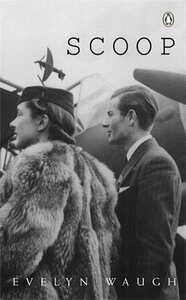You need to sign in or sign up before continuing.
Take a photo of a barcode or cover
Some classic, biting Waugh satire about journalism and people in power, mixed in with quite a bit of casual racism. Also somehow felt a bit long, even though it was actually quite short. I liked The Loved One better.
adventurous
funny
lighthearted
relaxing
medium-paced
Plot or Character Driven:
Plot
Strong character development:
No
Loveable characters:
Yes
Diverse cast of characters:
No
Flaws of characters a main focus:
Yes
funny
informative
medium-paced
Plot or Character Driven:
Plot
Strong character development:
Yes
Loveable characters:
Complicated
Diverse cast of characters:
Yes
Flaws of characters a main focus:
Yes
adventurous
funny
lighthearted
fast-paced
Plot or Character Driven:
Plot
Strong character development:
No
Loveable characters:
Yes
Diverse cast of characters:
Complicated
Flaws of characters a main focus:
Yes
It contained a great farcical and sarcastic vein throughout and I firmly enjoyed his writing style though his depictions of some characters did not sit right with me.
funny
lighthearted
medium-paced
funny
lighthearted
medium-paced
The only Waugh I’ve read before this was Brideshead Revisited, and boy is this a different book. Apparently in his lifetime, Evelyn Waugh was known as a great comedic writer, despite the somber nature of his masterpiece. And boy is this funny. Highly recommend listening to the audiobook, where the gentleman who reads it does a variety of incredible accents for the many characters in the book.
Scoop is a biting satire on the news industry, as relevant today as it was 80 years ago. Waugh himself used to be a foreign correspondent, and so this book is inspired by his time writing news articles abroad.k
Scoop is a biting satire on the news industry, as relevant today as it was 80 years ago. Waugh himself used to be a foreign correspondent, and so this book is inspired by his time writing news articles abroad.k
Once again I've put myself through another of Evelyn Waughs novels set in Africa. This time it was by accident; I picked this up as part of a big bundle with a load of other second hand books, and hadn't read the blub carefully enough. Waugh is a good writer, and the parts set in England (featuring a society he seems to know about) are good. The minute the characters are of British soil, things go downhill quickly. It just stops being funny, and fails to be interesting for any other reason.
adventurous
funny
lighthearted
fast-paced
Plot or Character Driven:
Character
Strong character development:
Complicated
Loveable characters:
Yes
Diverse cast of characters:
Yes
Flaws of characters a main focus:
Yes
By far this is probably hitherto the funniest of the Waugh I have read. A satirical take on the state of modern journalism, he showed his complete grasp over the psychology of the journalistic world and its endeavour to find a news story at any costs. Waugh left no stone unturned as he clearly conveyed his attitude towards this business of folks trapped within a web of sheer incompetence. No one is particularly sure of what to do besides pursuing the story at all costs:
"'I've felt like an ass for weeks. Ever since I went to London. I've been treated like an ass.' 'Yes,' said Mr Salter sadly. 'That's what we are paid for.'"
One of my favourite lines is one that accurately describes the purpose of the journalist and of news more generally:
"News is what a chap who doesn't care much about anything wants to read. And it's only news until he's read it. After that it's dead. We're paid to supply news. If someone else has sent a story before us, our story isn't news. Of course there's colour. Colour is just a lot of bull's-eyes about nothing. It's easy to write and easy to read, but it costs too much in cabling, so we have to go slow on that."
It is a highly amusing read, very cleverly written, and one of the finer light-hearted novels of the 20th century.
"'I've felt like an ass for weeks. Ever since I went to London. I've been treated like an ass.' 'Yes,' said Mr Salter sadly. 'That's what we are paid for.'"
One of my favourite lines is one that accurately describes the purpose of the journalist and of news more generally:
"News is what a chap who doesn't care much about anything wants to read. And it's only news until he's read it. After that it's dead. We're paid to supply news. If someone else has sent a story before us, our story isn't news. Of course there's colour. Colour is just a lot of bull's-eyes about nothing. It's easy to write and easy to read, but it costs too much in cabling, so we have to go slow on that."
It is a highly amusing read, very cleverly written, and one of the finer light-hearted novels of the 20th century.




